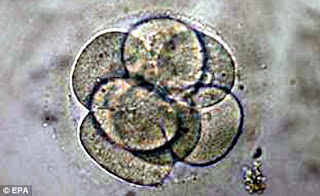
Posted on 04/26/2009 5:25:06 PM PDT by Lesforlife
By Beezy Marsh and Jo Macfarlane Last updated at 11:04 PM on 25th
April 2009 Couples could be allowed to store embryos in order to use them to create new body parts or cure diseases. Government legal and ethical experts are to discuss whether families can ‘bank’ embryos not just for procreation but also for use by doctors to create personalised treatments for parents and their children.
Now, embryos – the first stage of life after an egg has been successfully fertilised – can be stored for up to five years but only for procreation. But a huge ethical debate is set to erupt as the Government’s fertility watchdog, the Human Fertilisation and Embryology Authority (HFEA), moves closer to endorsing new developments in medical science. It will debate whether embryos could be stored to harvest important stem cells that have the ability to turn into any tissue type in the body. 'Spare parts': Government legal and ethical experts are to discuss whether families can 'bank' embryos for the creation of personalised treatments for parents and their children Research on using the cells is still in its infancy, but it is thought that within ten years it could lead to cures for degenerative conditions such as Alzheimer’s and Parkinson’s and some forms of cancer.
The embryos could also be used to grow new organs and bodily ‘spare parts’. Scientists have already successfully transplanted a windpipe grown from a patient’s own adult stem cells. However, storing embryonic cells is controversial as they allow the creation of embryos for a purpose other than new life. It means couples could have IVF simply to create a body-repair kit. A US company is already offering this service, which it has described as an ‘investment’ for the future.
(Excerpt) Read more at dailymail.co.uk ...
Cutting-edge evil !
Disclaimer: Opinions posted on Free Republic are those of the individual posters and do not necessarily represent the opinion of Free Republic or its management. All materials posted herein are protected by copyright law and the exemption for fair use of copyrighted works.